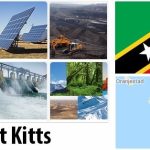Natural resources and energy
Bosnia is quite rich in minerals. In the area around Tuzla in the east as well as around Sarajevo and Zenica in the central part of the country there are large deposits of lignite. Bauxite is found in the north and around Mostar in the south. The energy potential is good, but the sector is poorly developed.
The extraction of iron ore and salt is great, and there are also good assets on copper, lead, zinc, gold and manganese. Timber and hydropower can also be counted as natural resources.
- COUNTRYAAH: Major exports by Bosnia and Herzegovina with a full list of the top products exported by the country. Includes trade value in U.S. dollars and the percentage for each product category.
Bosnia has good capacity to generate electricity and is a net exporter of electricity. Coal burning accounts for two-thirds of the electricity produced and water for the rest. Hydropower is so far only used to a limited extent.
In addition, Bosnia is dependent on imports for its energy supply, in particular oil and natural gas. The gas used mainly in the cities comes from Russia. Bosnia has suffered supply disruptions due to Russian conflicts with countries undergoing gas pipelines.
- Abbreviationfinder: A popular acronym site in the world covering abbreviation for each country. For example, BA stands for Bosnia and Herzegovina. Visit itypeusa for more information about Bosnia and Herzegovina.
Bosnia was one of the most polluted areas in Europe before the war, largely because of the metal industry. As the industry was extinct to such an extent, the pollution has decreased compared to the time before the war. At the same time, the fighting led to the destruction of many wastewater treatment plants and waste facilities, which means that the water is poor in many densely populated areas. The war also led to extensive land destruction.
FACTS – ENERGY AND ENVIRONMENT
Energy use per person
2,049 kilos of oil equivalent (2014)
Electricity consumption per person
3144 kilowatt hours, kWh (2014)
Carbon dioxide emissions in total
22 233 thousand tonnes (2014)
Carbon dioxide emissions per inhabitant
6.2 tons (2014)
The share of energy from renewable sources
40.8 percent (2015)
2014
December
Government formation completed in Republika Srpska
In the Republic of Srpska, the Independent Social Democrats Alliance (SNSD), the People’s Democratic Alliance (DNS), the Socialist Party (SP) and the Croatian Democratic Union (HDZ) agree to form a new government. Thus, one can also adopt a budget for 2015. On the other hand, government formation in the Federation is delayed and there you can adopt a temporary finance law for the first three months of the year, for the state’s institutions to function.
October
Elections in the nation, entities and cantons
October 12
In the election to the presidency, Bakir Izetbegović is re-elected as Bosnian representative while Dragan Čović wins the Croatian seat and Mladen Ivanić Serbs. In Republic Srpska, Milorad Dodik is re-elected president and his party SNSD remains the largest in the National Assembly. In the national parliament, the SDA is the largest with 9 seats, followed by the SNSD (6), the Democratic Front (5), SDS (5), SBB (4), HDZ BiH (4), SDP (3) and others (6). The turnout is just over 54 percent.
July
The massacre’s relatives are awarded damages
July 16
A verdict in a court in The Hague holds the Netherlands responsible for the murder of about 300 Bosniaks in Srebrenica in July 1995. The case concerns people who sought protection from the Bosnian Serb army of the UN force, but who were handed over to the Serbs where the UN force believed they were secure. Their survivors are now expected to be compensated by the Netherlands.
The European Court of Justice again states that Bosnia discriminates
July 15
The European Court of Human Rights (ECHR) gives Azra Zornić justice in a case similar to the Sejdić-Finci case in December 2009. Zornić has declared discrimination as she cannot stand as a candidate for the Presidential Council or the People’s House, Parliament’s House of Commons, as she identifies only as a Bosnian citizen (and not as a Bosniak, Croat or Serbian).
June
Political divide around the centenary
June 28
The centenary of the “Scots in Sarajevo”, which is believed to have triggered the First World War, is celebrated in the capital where the Vienna Philharmonic, among others, gives a concert. Bosnian Serb and Serbian politicians choose instead to participate in various events that pay tribute to the shooter, Bosnian leg Gavrilo Principle. In Eastern Sarajevo, a statue of Princip is inaugurated. The history books in the different parts of former Yugoslavia give completely different images of Principle: while many Serbs see him as a hero of freedom, he is seen by others as a terrorist.
May
Severe floods
After several months of rain in only a few days, the water rises over all the banks of Sava and other rivers. Bosnia, together with Serbia, is hit by the most difficult floods in a century. Tens of thousands of people are evacuated and around 25 people are killed in Bosnia. The situation is made more difficult by the fact that the water masses lead to landslides and a particular threat is that land mines from the wars of the 1990s come into operation.
April
The Minister of Security is dismissed
On the initiative of the Bosnian-nationalist party SDA, Fahrudin Radončić is dismissed as Minister of Security, because he failed to stop the riots in February. Radončić, who is a party leader for the reform-friendly SBB, explains that he did not want to police against justified protests against corruption in the country, protests that some politicians called terrorism.
February
Unrest in several parts of the country
The protests that started in Tuzla are spreading, mainly to other parts of the Federation, and are the worst since the war in 1992-95. In Sarajevo, protesters light both the cantonal government building and the federal presidential building. The heads of government in several of the Federation’s ten cantons resign. In several cities such as Sarajevo, Tuzla, Mostar and Zenica, the inhabitants form so-called citizen plenums, where anyone who wants to participate can discuss and propose changes and improvements and on how to put pressure on politicians to take such.
Protests against financial difficulties
February 5
A demonstration in Tuzla becomes violent when protesters throw stones into the government building and set fire to it. A large number of protesters and police officers are injured. The protest started the day before thousands of angry workers gathered outside the cantonal (regional) government building. They object to wages and pensions, but also to the inability of politicians to do something about the generally poor economic situation and high unemployment, while at the same time living well with high wages and various benefits. Students and political activists join the protests.











